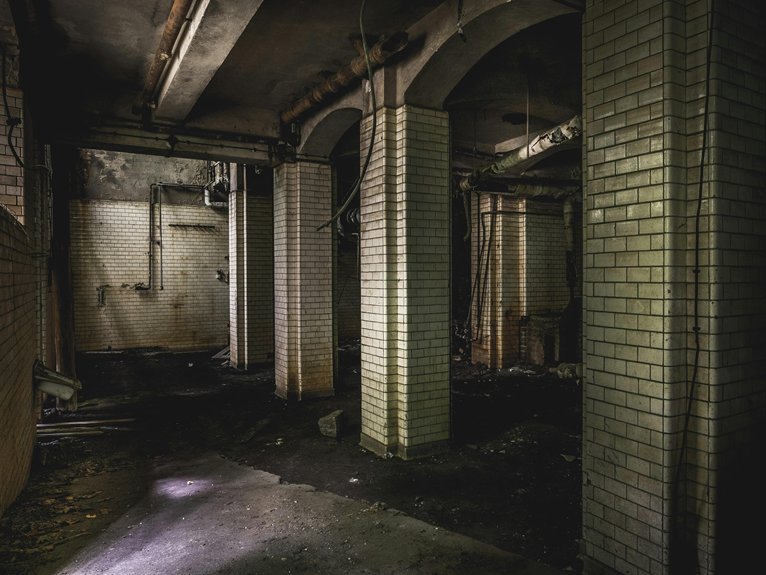When it comes to selecting basement waterproofing solutions in New Jersey, you’ve got a few key factors to evaluate. Your basement’s unique challenges, local climate, and soil conditions play a significant role in the effectiveness of your chosen method. Plus, recognizing signs of water damage early can save you money down the line. Understanding your options will help you make an informed decision, but there’s more to explore about maintaining that protection over time.
Key Takeaways
- Assess your specific basement’s moisture issues, including water table levels and humidity, to choose the most effective waterproofing method.
- Consider both interior and exterior waterproofing options to determine which best addresses your home’s unique needs.
- Evaluate the long-term effectiveness of solutions like French drains and sump pumps to ensure lasting protection against water intrusion.
- Budget for all costs, including inspection fees, materials, and labor, to avoid unexpected expenses during the waterproofing process.
- Research and compare different waterproofing systems to find the best alignment of cost, efficiency, and longevity for your basement.
Understanding Your Basement’s Unique Challenges
When it comes to understanding your basement’s unique challenges, recognizing the specific factors at play in New Jersey can make all the difference.
The state’s varying water table levels can greatly impact basement humidity, leading to potential moisture issues. If your home is near a high water table, you might experience higher humidity levels, making your basement a breeding ground for mold and mildew.
Regularly monitoring humidity and addressing any signs of water intrusion is essential. By staying informed about these factors, you can take proactive steps to maintain a dry and healthy basement, ensuring a safer living environment for you and your family.
Evaluating Different Waterproofing Methods
When it comes to keeping your basement dry, you’ll want to explore various waterproofing methods.
From interior solutions that tackle moisture at the source to exterior techniques that prevent water from entering, understanding your options is essential.
Plus, comparing drainage systems can help you choose the best fit for your home’s unique needs.
Interior Waterproofing Solutions
Although you may not always see the signs of moisture damage, addressing potential issues with interior waterproofing solutions is essential for maintaining a dry and healthy basement. Here are some effective interior sealing methods and moisture barriers to contemplate:
| Method | Description |
|---|---|
| Interior Sealants | Create a protective layer against moisture. |
| French Drains | Direct water away from the foundation. |
| Sump Pumps | Remove accumulated water effectively. |
Exterior Waterproofing Techniques
To keep your basement dry and protected from water intrusion, exploring exterior waterproofing techniques is essential.
One effective method is ensuring proper foundation drainage. Installing drainage systems like French drains can help channel water away from your home, preventing buildup around your foundation.
Additionally, surface grading plays an important role; it involves sloping the ground away from your foundation to direct water runoff. This simple adjustment can greatly reduce the risk of moisture seeping into your basement.
Drainage Systems Comparison
Proper foundation drainage is just one piece of the puzzle when it comes to keeping your basement dry. You’ll find various drainage types, such as interior and exterior systems, each with its own merits.
Interior drainage systems, like sump pumps, are often easier to install and maintain, but may lack the long-term efficiency of exterior systems that redirect water away from your foundation.
Compare the system efficiency of each option based on your specific needs, climate, and soil type. Understanding these differences will help you make an informed decision that protects your basement from water damage effectively.
Assessing Local Climate and Soil Conditions
Understanding the local climate and soil conditions is essential for effective basement waterproofing in New Jersey.
You need to evaluate how these factors influence your basement’s vulnerability to water intrusion.
Consider the following:
- Climate impact: Heavy rainfall and humidity can exacerbate water issues.
- Soil permeability: Highly permeable soils allow more water to seep through.
- Frost line depth: Understand freeze-thaw cycles that can affect foundation stability.
- Drainage patterns: Identify how your property’s topography directs water flow.
Identifying Signs of Water Damage
After evaluating the local climate and soil conditions, it’s important to recognize the signs of water damage in your basement.
Look out for water stains on walls or floors, as they indicate moisture intrusion. Dark spots or peeling paint can also signal problems.
Pay attention to any musty odors, which often suggest mold growth. If you notice condensation on surfaces or visible mold, it’s a clear sign that water is present.
Addressing these issues promptly can prevent further damage and protect your home’s structure. Stay vigilant and act quickly to safeguard your basement from water-related issues.
Budgeting for Waterproofing Solutions
When you’re planning your basement waterproofing project, it’s crucial to assess the total costs involved.
You’ll want to compare different methods to find the best fit for your budget and needs.
Don’t forget to factor in long-term maintenance expenses, as they can greatly affect your overall investment.
Assessing Total Project Costs
Budgeting for basement waterproofing in New Jersey can seem intimidating, but breaking down the costs into manageable parts makes it easier.
To effectively assess your total project costs, consider these key components:
- Initial inspection fees
- Materials and supplies
- Labor costs
- Potential permits
Creating a detailed cost breakdown helps you understand where your money’s going and allows you to adjust your project timeline accordingly.
By planning carefully, you can avoid unexpected expenses and guarantee a successful waterproofing project.
Comparing Different Methods
Choosing the right waterproofing method for your basement can greatly impact your budget and the effectiveness of the solution. You’ll find several options, including interior and exterior drainage systems, which may involve foundation repair costs.
A sump pump is often a key component in these systems, helping to manage water accumulation. While interior methods can be less expensive upfront, they might require more frequent maintenance.
On the other hand, exterior solutions may have higher initial costs but can offer long-lasting protection. Assess your specific needs and budget to find the most suitable waterproofing method for your home.
Long-term Maintenance Expenses
While you may have invested in a waterproofing solution for your basement, it’s essential to contemplate the long-term maintenance expenses that come with it.
A thorough cost analysis will help you budget effectively. Here are some key maintenance tips to keep in mind:
- Regularly inspect the waterproofing system
- Clean gutters and downspouts to prevent water buildup
- Monitor humidity levels to avoid mold growth
- Schedule professional check-ups every few years
Researching Professional Installation Options
How do you know which professional installation option is right for your basement waterproofing needs in New Jersey? Start by researching contractors with solid professional certifications, ensuring they’re qualified and knowledgeable.
Look for companies that offer installation warranties; this shows they stand behind their work and are committed to quality.
Read reviews and ask for references to gauge customer satisfaction. Don’t hesitate to ask potential installers about their experience with similar projects.
Maintaining Your Waterproofing System
To keep your basement waterproofing system effective over time, regular maintenance is vital.
By performing seasonal maintenance and regular inspections, you can prevent costly damage.
Here are some key steps to follow:
- Check gutters and downspouts for clogs
- Inspect the foundation for cracks or signs of water
- Make certain sump pumps are functioning properly
- Clear drainage systems of debris
Conclusion
Choosing the right basement waterproofing solution in New Jersey is essential for protecting your home. By understanding your unique challenges, evaluating different methods, and considering local conditions, you can make an informed decision. Don’t forget to budget for both installation and maintenance, ensuring your investment lasts. Researching professional options will help you achieve the best results. With the right approach, you can keep your basement dry and free from mold, enhancing your property’s value and comfort.

